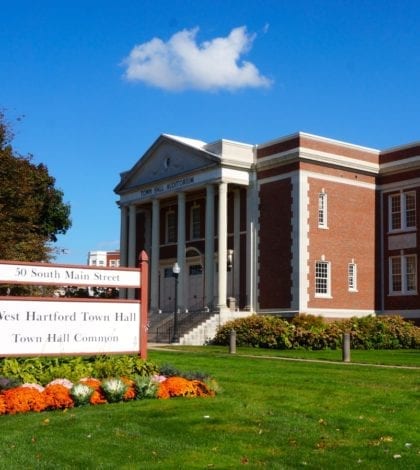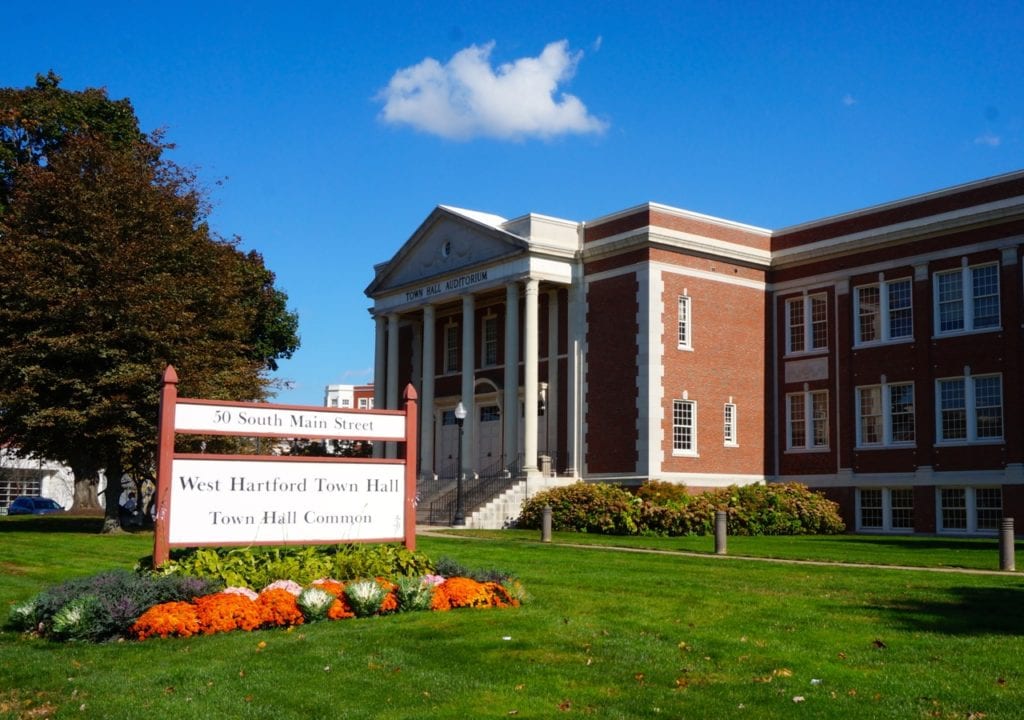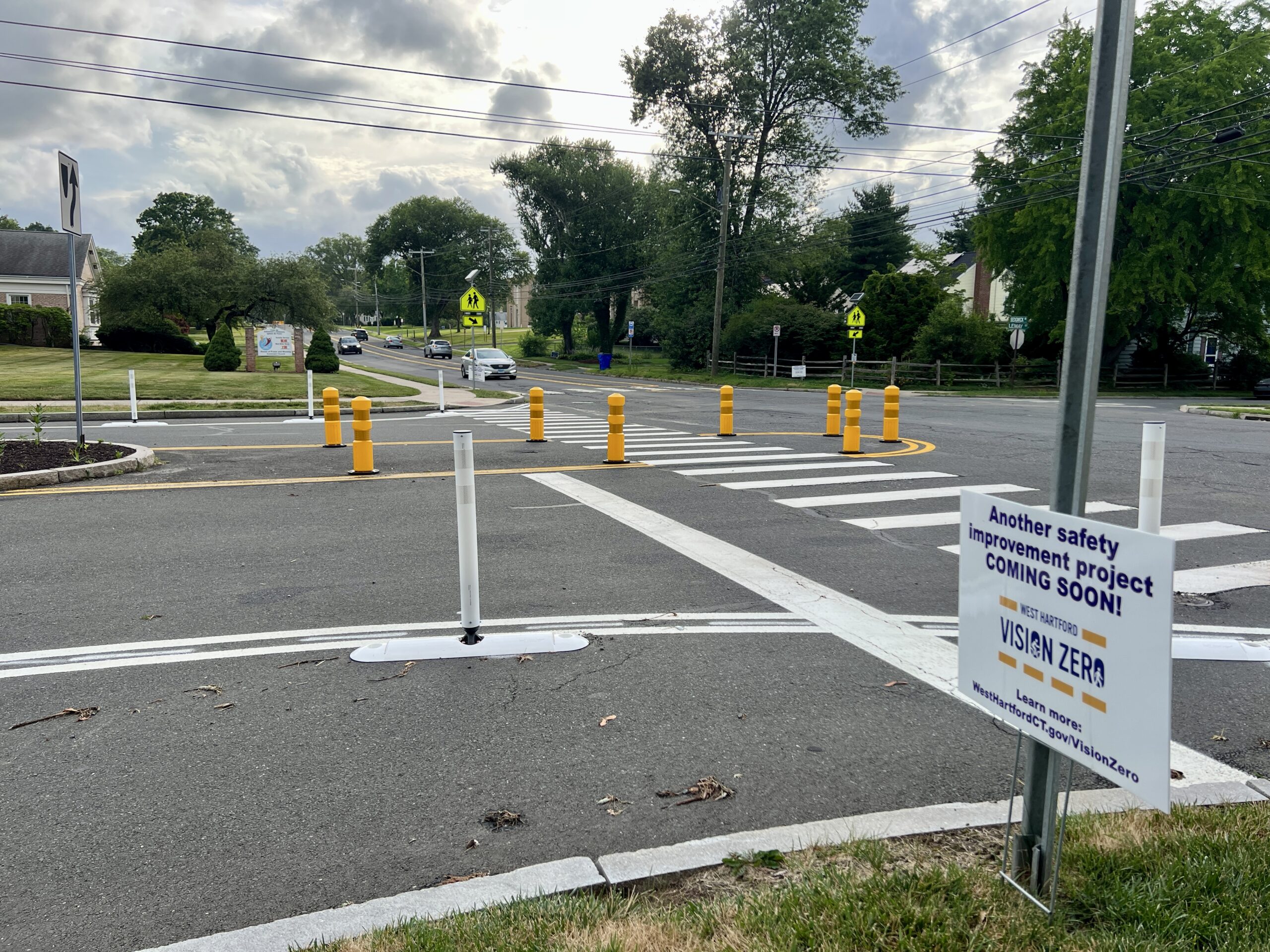Hartford’s Financial Condition and MDC Will Impact West Hartford’s Next Budget

Audio By Carbonatix

West Hartford Town Hall. Photo credit: Ronni Newton
The West Hartford Town Council will host a community discussion with Hartford Mayor Luke Bronin on Dec. 6 to discuss Hartford’s finances and regionalization.

West Hartford Town Hall. Photo credit: Ronni Newton
By Ronni Newton
The City of Hartford’s financial woes are no secret, and uncertainty about the city’s financial solvency has impacted the Metropolitan District Commission’s (MDC) sale of bonds, leading to a direct impact on West Hartford’s FY2018 budget which will be approved in April 2017.
Hartford’s financial situation is complicated – and serious – West Hartford Town Manager Ron Van Winkle said. Hartford Mayor Luke Bronin has accepted an invitation from the Town Council and town administrators to participate in a community forum at Town Hall on Dec. 6, at 7 p.m., to discuss the city’s finances as well as regionalism.
“This is a very serious thing going on with our capital city. Letting them go bankrupt is not necessarily the best option. We need to hear from the mayor,” Van Winkle said.
West Hartford Mayor Shari Cantor said she’s hoping residents will attend the forum and take advantage of the opportunity to ask questions.
Because of Hartford’s precarious financial situation, West Hartford and the other six MDC member towns are being required to pay into a reserve fund to protect against Hartford’s inability to pay its share of sewer costs. West Hartford’s share is $1,776,519 for FY2018, Van Winkle said.
“We have no choice,” Cantor said.
Cantor, Van Winkle, and West Hartford Director of Financial Services Peter Privitera had extensive meetings with the MDC in an attempt to come up with alternatives. Officials from other member towns proposed alternative solutions as well, but the MDC determined it needed the reserve in order to obtain a favorable rate on the $173 million bond sale it held last week, a rate which Van Winkle said the agency did receive.
“We’re stuck with the MDC,” Van Winkle said. “If we were not a member we would still have to buy our water and be charged for our sewage,” he said, and that would be more costly to the town.
The situation with the reserve wasn’t expected, and Van Winkle said that the MDC needs to make some changes to its charter going forward.
“We need to make sure this never happens again,” Cantor said. The MDC’s current charter gives them the authority to require its member towns to fund the reserve, and because the MDC is a municipality it’s a levied tax that the town must pay.
“This is something that has to be fixed.” Cantor said she has already discussed it with West Hartford’s legislative delegation and hopes that something can be done before the possibility of Hartford defaulting on its payments to the MDC.
Van Winkle said that according to Bronin, Hartford will be able to make its first two quarterly payments to the MDC – in January and April of 2017. The amount of the reserve has been calculated based on the possibility of Hartford not having the funds to satisfy its July 2017 and October 2017 payments.
West Hartford’s current fiscal year ends on June 30, 2017, so the reserve payment that the town has to make won’t affect the current budget, but in the FY2018 budget, which will be approved in April, the $1,776,519 figure will appear as an expense item.
The options for funding that expense include charging taxpayers through the FY2018 mill rate, or using an expected surplus.
Van Winkle said that as of now the town should have enough in surplus from the current year’s budget to use for the reserve. Although the surplus could be impacted by an extremely harsh winter, he’s fairly confident enough will be available without any need to touch the town’s fund balance.
“It’s the administration’s recommendation to look to the surplus, which we have,” he said – an approach which avoids levying potentially unnecessary taxes. If Hartford finds a way to make its payments, West Hartford won’t have to pay into the reserve.
Taxpayer money is still being used, he said, but it’s money from taxes that have already been paid.
Van Winkle is dealing with other challenges as he looks ahead to the FY2018 budget. In addition to the $1,776,519 reserve expense, the MDC has increased West Hartford’s operating expenses by $618,400, a combined total of more than $2.3 million. “That’s 1 percent [increase in West Hartford’s budget] before even paying a teacher,” Van Winkle said.
The state legislature has capped towns’ tax increases at 2.5 percent and will reduce grant monies if that figure is exceeded, but Van Winkle said there will be a major push this year for that law to be amended. It will be very hard for West Hartford to keep its budget increase below that 2.5 percent cap. “With all the uncertainty this is not the year to step into it,” he said.
There is some good news, however, regarding West Hartford’s grand list.
New assessments have been mailed out and residents have the ability to question and/or ask for revisions, but the grand list will finalized by the end of January. Revaluation is showing very strong growth across town, with increases in home values, particularly those near the Center, and especially in the value of commercial properties.
“We’re seeing strong growth in the grand list, stronger than in years,” Van Winkle said.
During the last revaluation, in 2011, “commercial properties were in a doldrum,” Van Winkle said, and the tax burden was shifted more toward residential property. Redevelopment, and new development, as well as higher assessments of commercial property, will somewhat shift the burden away from homeowners.
West Hartford’s FY2018 budget will be proposed in early March 2017, and approved by the Town Council at the end of April.
Like what you see here? Click here to subscribe to We-Ha’s newsletter so you’ll always be in the know about what’s happening in West Hartford!



